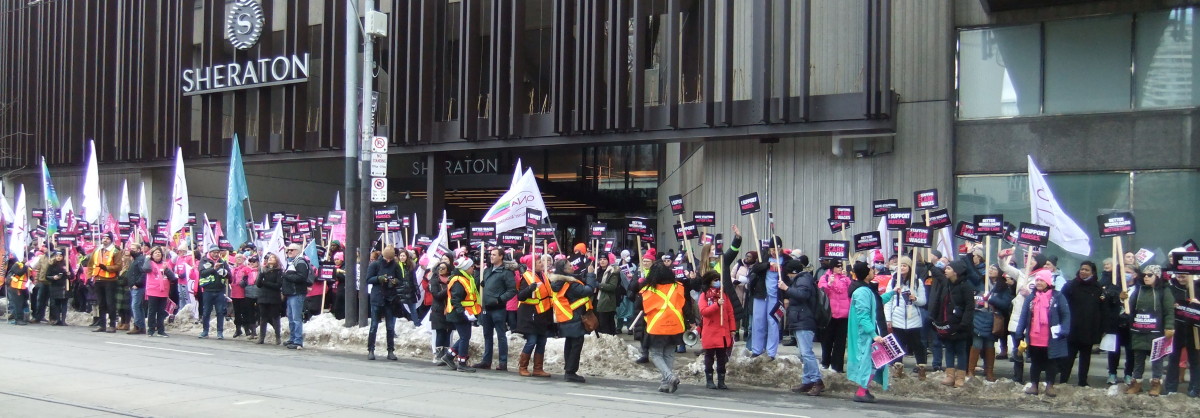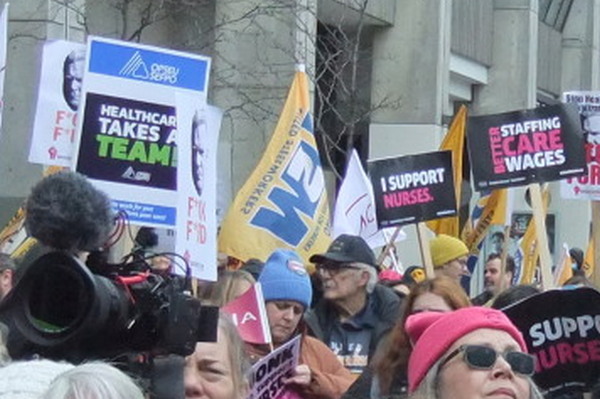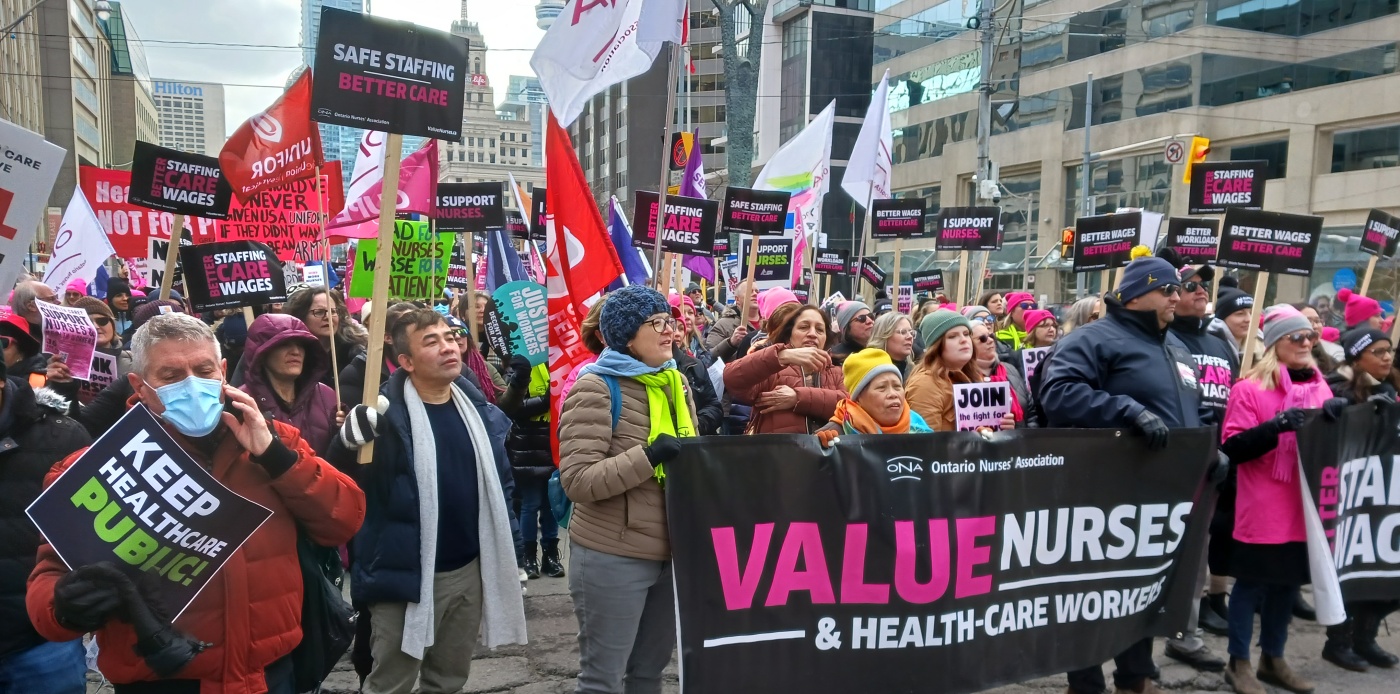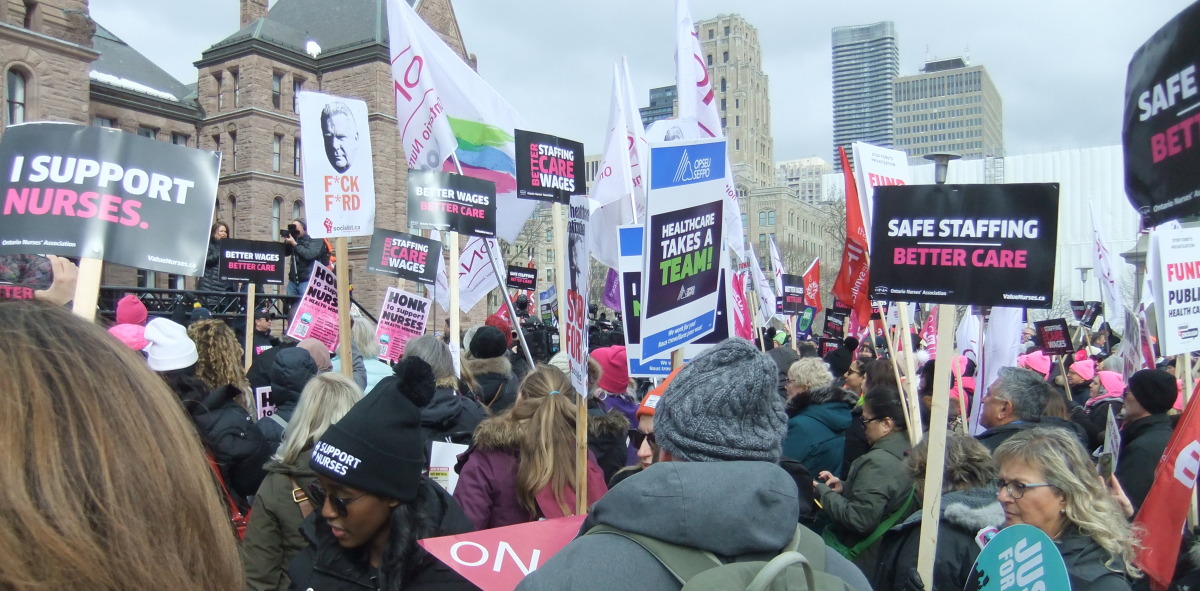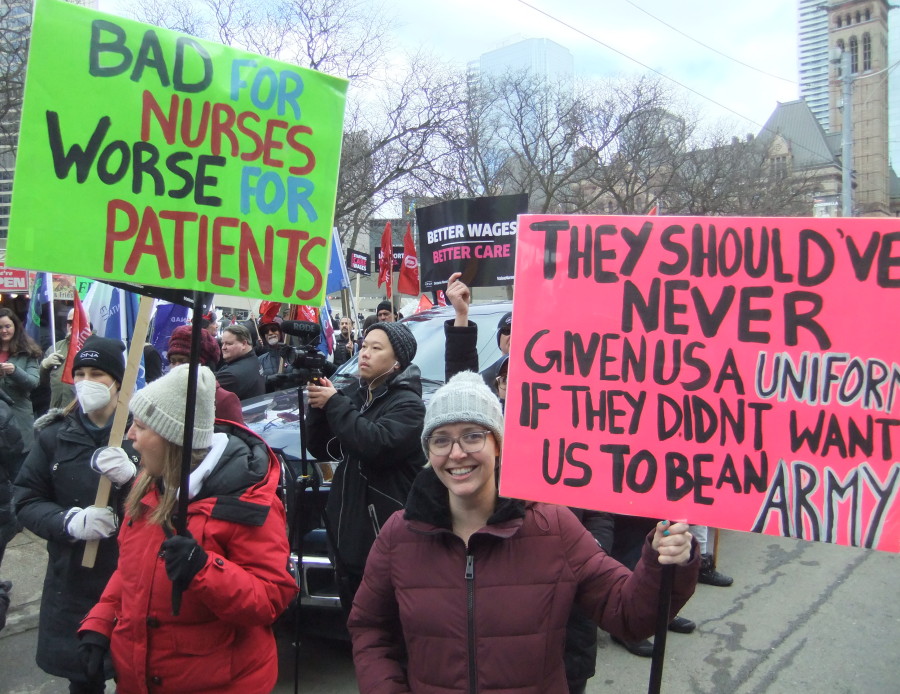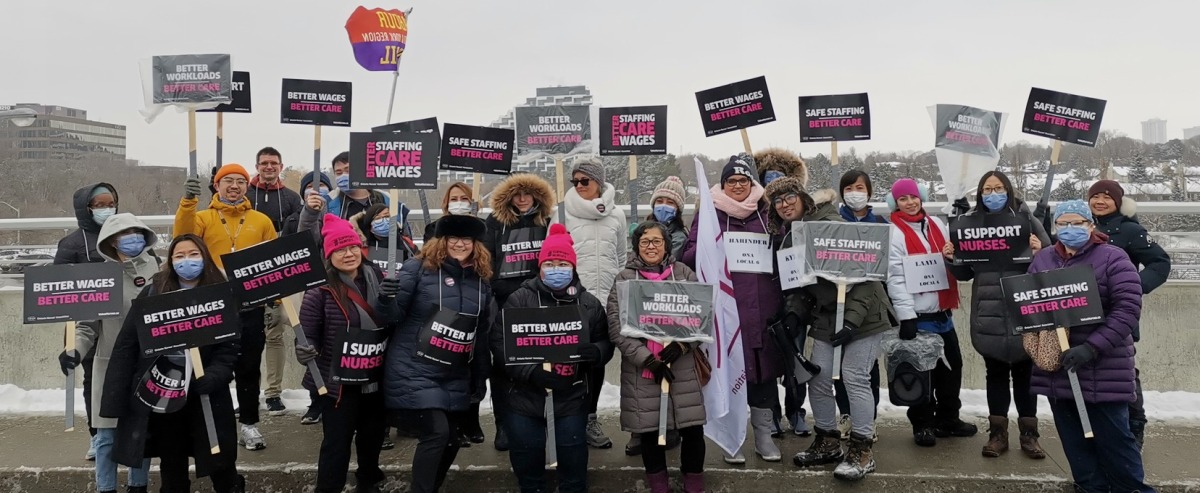March 3, 2023 - No. 9
Attacks on Quebec Public Sector Unions
Upping the Use of Executive Powers
Against Workers

Health care workers picket outside of Sainte-Croix
Hospital in Drummondville, February 26, 2023, refusing to submit
to restructuring arbitrarily imposed by the regional health
authority.
All Out to Support Nurses and Health Care Workers!
• Mauricie-Centre-du-Québec Nurses Say No to Restructuring of Care on Backs of Workers
• Nova Scotia Health Care Workers' Solutions to Immediately Improve Retention and Recruitment
• Ontario
Nurses Hold Militant Mass Rally and Province-Wide Pickets
• Windsor Nurses Speak Out on Right to Health Care
Attacks on Quebec Public Sector Unions
Upping the Use of Executive Powers
Against Workers
Quebec Premier François Legault and Treasury Board Chair Sonia LeBel, who is responsible for negotiations with public sector workers, have launched a much-publicized attack on workers and their unions. Unions are currently attempting to renew their collective agreements, which expire on March 31, by negotiating wages and working conditions that workers deem acceptable.
 Premier Legault denounced the
unions for being close-minded because they refuse to participate
in what he calls public discussion forums held by the government
outside and against the legitimate negotiating process. His
media campaign is to sow doubt in the unions' insistence that
talks be held during actual negotiations where the unions can
present the workers' demands. The unions point out that the
government's proposed public discussion forums are unacceptable
because they bypass the central and local negotiating tables and
legal processes. Furthermore, the government which has the state
power on its side, is the one setting the agenda of these forums
based on what it calls "foundational changes" it has identified
as priorities. What it means by "foundational changes" is
revealed by the overall topic in these discussions which is what
the government calls the need for more flexibility within the
collective agreements.
Premier Legault denounced the
unions for being close-minded because they refuse to participate
in what he calls public discussion forums held by the government
outside and against the legitimate negotiating process. His
media campaign is to sow doubt in the unions' insistence that
talks be held during actual negotiations where the unions can
present the workers' demands. The unions point out that the
government's proposed public discussion forums are unacceptable
because they bypass the central and local negotiating tables and
legal processes. Furthermore, the government which has the state
power on its side, is the one setting the agenda of these forums
based on what it calls "foundational changes" it has identified
as priorities. What it means by "foundational changes" is
revealed by the overall topic in these discussions which is what
the government calls the need for more flexibility within the
collective agreements.
Recent events in the Mauricie-Centre-du-Québec region are a
clear example of what the government's demand for "flexibility"
is all about. In the Mauricie-Centre-du-Québec nurses are
protesting against the imposition of working conditions which
force them to work in sectors they are not familiar with, which
entails associated risks for themselves and patients. This is
the restructuring the government wants to impose across the
board.
The Quebec Premier is trying to drive a wedge between workers and their unions: "But in the meantime, it is you who are waiting in the emergency room and the nurses who are working under difficult conditions," he wrote in his February 25 Facebook post. "Meanwhile, teachers are working under less than ideal conditions. If the union leaders agreed to change their attitude, to get out of their close-minded logic and come and discuss with us to change things, it would happen faster. It would be better for Quebeckers and it would be better for nurses and teachers. I sincerely hope that the union leaders quickly accept to become part of the solution. We're waiting for them."
Meanwhile, the Premier and the Treasury Board Chair are moving towards declaring these so-called forums an actual central bargaining table.
In a February 27 radio interview, the Treasury Board Chair referred to the discussion forums as "bargaining tables" with the unions, a "place beside" the other tables, "an added central table."
Earlier in the month an article was published on the Treasury Board website entitled "Fast-Track Bargaining Forums – Negotiations: Government Walks the Talk."
The article states: "A government offer was presented today at the accelerated bargaining forums' Team Classroom, Team Care and Team Mental Health, held in preparation for the renewal of the 2020-2023 public and parapublic sector collective agreements. This offer, unprecedented at the beginning of negotiations, was put forward by Sonia LeBel, Minister Responsible for Government Administration and Treasury Board Chair."
A central bargaining table is a table that brings together the negotiating committees of both parties, employers and unions, which sort out national issues such as wages, pensions and others. It should be noted that these fast-track negotiation forums were so fast-tracked that if they were held at all, it was without the presence of any union representatives.
It is very arrogant from those who have wrecked the health and
social services system to point fingers at others and claim to
be the ones with solutions. Among other things, they managed the
pandemic through ministerial orders for two and a half years,
thereby cancelling workers' negotiated terms and conditions of
work. This led to mass resignations in the health system. The
resultant even more untenable conditions are the fault of the
government, nobody else. Workers rightly reject all efforts to
deny them their voice and the demands and solutions they are
intent on bringing to the bargaining tables where, through
negotiations, mutually acceptable agreements are supposed to be
reached.
Preparing the Ground for New Ministerial Coups
By engaging in this public attack against public sector unions,
the Legault government is clearly trying to undermine
negotiations. The Interprofessional Health Care Federation of
Quebec (FIQ) has revealed that it proposed 28 meeting dates to
employer organizations in February and March, and that the
latter retained only four. In its propaganda, the government
denigrates the negotiations by saying that they are
interminable, that there are too many unions at play
representing the same sector, each with its own demands, and
that the situation is urgent. Discrediting bargaining and
putting the blame for stalling on the unions at a time
correcting the untenable situation in the hospitals, education
and health care sectors is urgent, goes hand in hand with the
propaganda that there are too many unions in the same sector and
that a centralized form under ministerial direction is required
to protect the public, protect the workers and hasten the
process. It is all done self-righteously, in the name of
equality and the public good.
"There's no way that I'm going to have two classes of teachers or two classes of nurses in Quebec. We have more than one union representing nurses and more than one union representing teachers," Minister LeBel told La Presse earlier in February.
Under the pretext of urgency and the collective good, unions
are presented as having narrow, diverging interests. The aim is
to prepare for the imposition of wages and working conditions
which the workers oppose. It is also geared towards the creation
of a decision-making body under ministerial authority. What was
initially referred to as a "public discussion forum," quickly
became a "negotiation table," without bothering to inform the
unions how they would be incorporated in some form, let alone
consulting them or permitting the workers to take the decisions
which affect their lives.
The situation is being used as a testing ground for further state restructuring whereby executive powers are further strengthened to serve narrow private interests. This has nothing to do with a human-centred solution to any problem in health, education or other social public services. To declare public discussion forums which cancel out all spaces for workers' voices to be heard is fraud and the government should be held to account.
In that respect, it is in the interests of unions to maintain
their rejection of such forums and insist their claims and
solutions be put on the table for negotiation. The use of the
state ministerial powers to achieve an outcome which narrow
private interests want will only make the situation in the
public sector much worse. The workers' wages and working
conditions are the students' learning conditions and the
public's health care conditions. They are one. The workers and
their unions, not the government, stand on the moral high ground
in this battle against the attempt of government to act with
impunity in the name of the public good.
(Quotations translated from original French by Workers' Forum.)
All Out to Support Nurses and Health Care Workers!
Mauricie-Centre-du-Québec Nurses Say No! to
Restructuring of Care on Backs of Workers

Mass rally at Sainte-Croix Hospital in Drummondville, February
26, 2023
The nurses of Mauricie-Centre-du-Québec, supported by all health care workers, are engaged in a mass struggle to defeat the restructuring of care decreed by management at the region's Integrated University Health and Social Services Centre (CIUSSS MCQ).
On February 6, in the name of dealing with the shortage of nurses in the Mauricie and Centre-du-Québec region's hospitals and residential and long-term care centres (CHSLDs), management at the CIUSSS announced that nurses in all sectors would have to work at least one weekend out of three. The measure came into effect on February 26 at Sainte-Croix Hospital in Drummondville and is to be gradually extended to all nurses in the region by the fall of 2023.
 The directive includes moving
nurses to wherever the CIUSSS assigns them to work on weekends.
For example, nurses employed in home care or in a school setting
may be forced to work in hospital emergency rooms or CHSLDs.
CIUSSS management has also notified that other similar measures
are to be announced soon with regard to the summer. The Union of
Health Care Professionals for Mauricie-Centre-du-Québec
(FIQ-SPSMCQ), which represents the nurses, has also been made
aware of a document foreseeing the merging of departments in
health facilities. This would mean a greater displacement of
nurses to sectors unfamiliar to them, the closing of services,
the elimination of positions, more exhaustion for nurses and a
further deterioration of services overall.
The directive includes moving
nurses to wherever the CIUSSS assigns them to work on weekends.
For example, nurses employed in home care or in a school setting
may be forced to work in hospital emergency rooms or CHSLDs.
CIUSSS management has also notified that other similar measures
are to be announced soon with regard to the summer. The Union of
Health Care Professionals for Mauricie-Centre-du-Québec
(FIQ-SPSMCQ), which represents the nurses, has also been made
aware of a document foreseeing the merging of departments in
health facilities. This would mean a greater displacement of
nurses to sectors unfamiliar to them, the closing of services,
the elimination of positions, more exhaustion for nurses and a
further deterioration of services overall.
All of this has been done without the approval or even consultation with those most affected: those delivering the services, caring for people and saving lives. It has been done in the name of relieving nurses who are experiencing the worst mandatory overtime situations and labour shortages. It is done by so-called increasing the flexibility of the working conditions and collective agreements of all nurses. These are precisely two of the main themes of the Legault government's current offensive, which speaks volumes about what is meant by flexibility.
Nurses in the region have been involved in the fight against this arbitrariness and dictate since the announcements were made. During a general membership meeting, nurses expressed their resolve to resign en masse if the measures are not withdrawn. They started signing letters of resignation to show just how outraged and determined they are. They began engaging in job actions, such as no longer providing statistics unessential to care, used for management purposes. The union has announced a $1 million defence fund to compensate nurses who face retaliatory measures because they refuse to change departments when working on weekends.
 Instead of talking to the nurses
and discussing with them how workforce and service issues can be
addressed, CIUSSS management rushed to the Administrative Labour
Tribunal (TAT) to have the nurses' actions declared illegal. It
argued that the nurses' actions were concerted and akin to a
strike during a period when the collective agreement is in
effect, which is illegal under labour law. The judge agreed with
them in her January 25 ruling. CIUSSS management cried victory,
while nurses remain firmly opposed to the announced measures
that only aggravate all the problems.
Instead of talking to the nurses
and discussing with them how workforce and service issues can be
addressed, CIUSSS management rushed to the Administrative Labour
Tribunal (TAT) to have the nurses' actions declared illegal. It
argued that the nurses' actions were concerted and akin to a
strike during a period when the collective agreement is in
effect, which is illegal under labour law. The judge agreed with
them in her January 25 ruling. CIUSSS management cried victory,
while nurses remain firmly opposed to the announced measures
that only aggravate all the problems.
On January 26, hundreds of nurses and health care workers demonstrated in Drummondville to demand that the measures be withdrawn and to let it be known that the struggle continues.
Many nurses held placards displaying their job numbers, with slogans such as "From Heroes to Just Numbers" or "Just a Number," denouncing the fact that the current system turns them into things when they are human beings with rights, including the essential right to play a decisive role in all decisions that affect them. The struggle continues and Workers' Forum salutes this vigorous fight in defence of the rights and voice of health care workers and the services people depend on for their existence.
(Photos: FIQ)
Nova Scotia Health Care Workers' Solutions to Immediately Improve Retention and Recruitment
Workers' Forum: You were quoted recently in The Signal newspaper as saying: "I believe we are at a breaking point," in reference to the situation in health care. Can you tell us more about this?
Sandra Mullen: We have been working with our health care folks and our nursing people for the past number of months. It is a crisis that they have been managing. When we say that it's at a breaking point, folks are leaving. As you know, across the country, everybody is in the same situation.
Some provinces are offering incentives and luring people back.
There are people leaving Nova Scotia. I know one person myself,
somebody who went back to PEI where she was from, as the
government and the health authority there had such an incentive
program that it drove our nurse away.
Pay is important, so when one province increases the pay rate in a certain sector, it depletes the resources we have, as people are leaving because the working conditions are terrible. When you combine all of that, you have a 30-year nurse, or a 20- or a 15-year nurse saying that they can't do that job any longer. They're looking for anything that provides better working conditions. So when we go to government and talk about recruitment and retention, we're saying that it's not just about wages, that we have to make improvements to working conditions.
We met with our emergency room (ER) department folks before
Christmas. They were at a breaking point. They are so
short-staffed and the concern was that people would die in the
waiting room. And before we could get our information out and
contact the government, somebody died in a waiting room in
Amherst, in one of our local hospitals, close to the New
Brunswick border. It's not our staff that manages that site,
it's the Nova Scotia Nurses' Union.
All emergency rooms are so overburdened because we have a terrible lack of family doctors. The numbers have increased. We hear that they went from 90,000 to 120,000 Nova Scotians who are without a family doctor. If you don't have a family doctor, you end up in critical situations and then in an emergency room. All of those things have made the news, which have pushed this agenda. We have written a letter to government and to the health authority with 59 recommendations on some of the ways they can improve working conditions. I know you can't build a hospital overnight to increase bed capacity. Government did come out with a plan to improve the situation. Some of the things that they said need to be done, but they're not a quick fix.
Then there's the issue of travel nurses, nurses who work for an agency and do nursing as directed. They get a higher wage because they have no benefits. They go where the company tells them to go. Some of the complaints our folks have are that these nurses left their employment with the health authority, have taken a job with the agency and then show up back in the hospital, working beside the people they used to work with, but they are paid way more. Or they're working at a different hospital without access to IT [information technology], so they can't go to a computer and check the blood, so they are not fully capable, in some cases, to do the work that full-time permanent staff would do.
They are not the answer. The government has been paying millions of dollars for these travel nurses and of course the agency is getting a pile of money too. We are saying that the government has to address the issue of recruitment and retention. We need to be competitive with the other provinces, because everybody is after the same people.
We have to be able to keep staff with a competitive wage and be competitive when recruiting people as well. It's the same with the signing bonuses, or we are going to lose people to other provinces. And this is the crisis in health care across this country.
WF: Can you tell us something about the recommendations you made to the government regarding the emergency department crisis?
SM: In the recommendations, we deal with everything from security of staff to paying extra for nurses who are working short, to the inclusion of compensation packages that help to address that shortage.
But we also talk about their working conditions. For example, we need more triage nurses and support staff on-duty during the day, to allow for timely triage assessments. Our recommendations deal with changing the culture of having no breaks. Breaks are important because they reduce errors and will retain staff. Managers must actively plan for staff breaks. Our recommendations talk about registered nurses having to do blood work, as there are other people who could be doing that. We have to make use of other resources within the hospital and the health authority. The resources are not used in the best way.
Our recommendations also talk about providing basic patient comforts. Our people are working in conditions where there are folks sitting in the ER for 12-14 hours, and when you finally get them attended to, there's no food for them, there's not even tea or toast, because food services have closed. Basic food has to be available and provided to those patients.
We are working with the employer and our members to come up with solutions that would work in the interim. Our nurses have started bargaining and there are many things at issue that are beyond money. Certainly recruitment and retention are major issues.
We are constantly working with our members, on their behalf, to ensure that their safety and their concerns are met.
Ontario Nurses Hold Militant Mass Rally and Province-Wide Pickets
More than 2,000 nurses and health care professionals, fellow workers and community allies converged at the Sheraton Centre in Toronto on March 2, outside negotiations between the Ontario Nurses' Association (ONA) and Ontario Hospital Association for a new contract covering 60,000 nurses and health care workers working in hospitals.
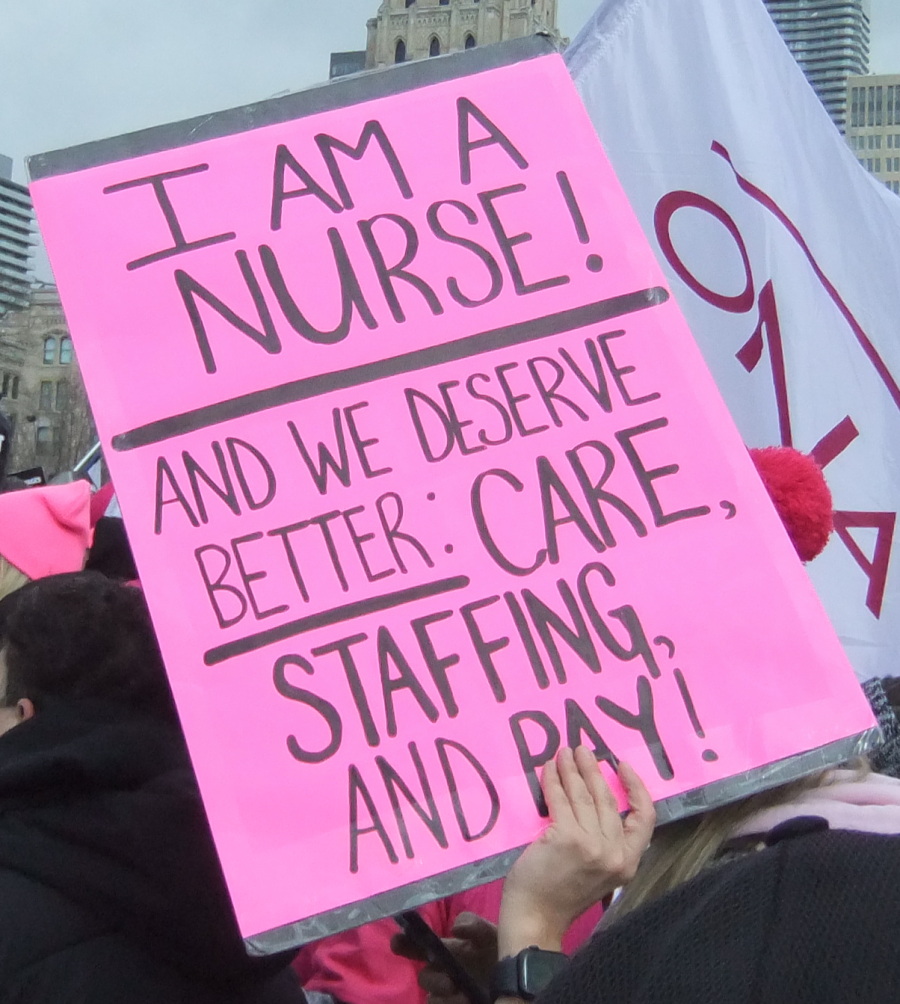
The rally was opened by Bernie Robinson, Acting President of the ONA. She announced that more than 40 pickets had taken place across Ontario on February 23 in the lead up to this rally. A number of nurses from across the province also addressed the rally, expressing their dedication to nursing and their frustration at seeing their colleagues leave in droves, forced out by untenable working conditions and low salaries which drove nurses to leave public hospitals to work for private agencies or to quit the profession entirely. One nurse pointed out they are losing people with 20 and 30 years of experience who should be there to mentor young nurses, while another expressed the nurses' conviction to resolve the situation in their favour and that of the public, saying, "Nurses are essential, Doug Ford is not."
Following the rally, the participants marched up University
Avenue along Hospital Row to Queen's Park, chanting slogans
along the way. Nurses and hospital workers taking their breaks
lined up outside their workplaces with signs and joined in as
the march went by. Motorists and pedestrians also expressed
support for the nurses. The action ended in front of Queen's
Park with the nurses expressing their determination to continue
the fight to win the wages and working conditions needed to
provide the high standard of care that patients require.
February 23 Province-Wide Pickets
Hamilton
Toronto
Peterborough
Sudbury
Owen Sound
Englehart
Sarnia-Lambton

Windsor
(Photos: WF, EmpowerYourselfnow.ca, WDLC, Manda DM, C. Knox, A. Langeman, OSSTF, PDLC, TYRLC, Jahan N.)
Windsor Nurses Speak Out on Right to Health Care
Listen to what nurses in Windsor had to say about what they do and what's needed to guarantee the right to health care, during Ontario nurses' province-wide actions on February 23.
(To access articles individually click on the black headline.)
Website: www.cpcml.ca Email: editor@cpcml.ca





